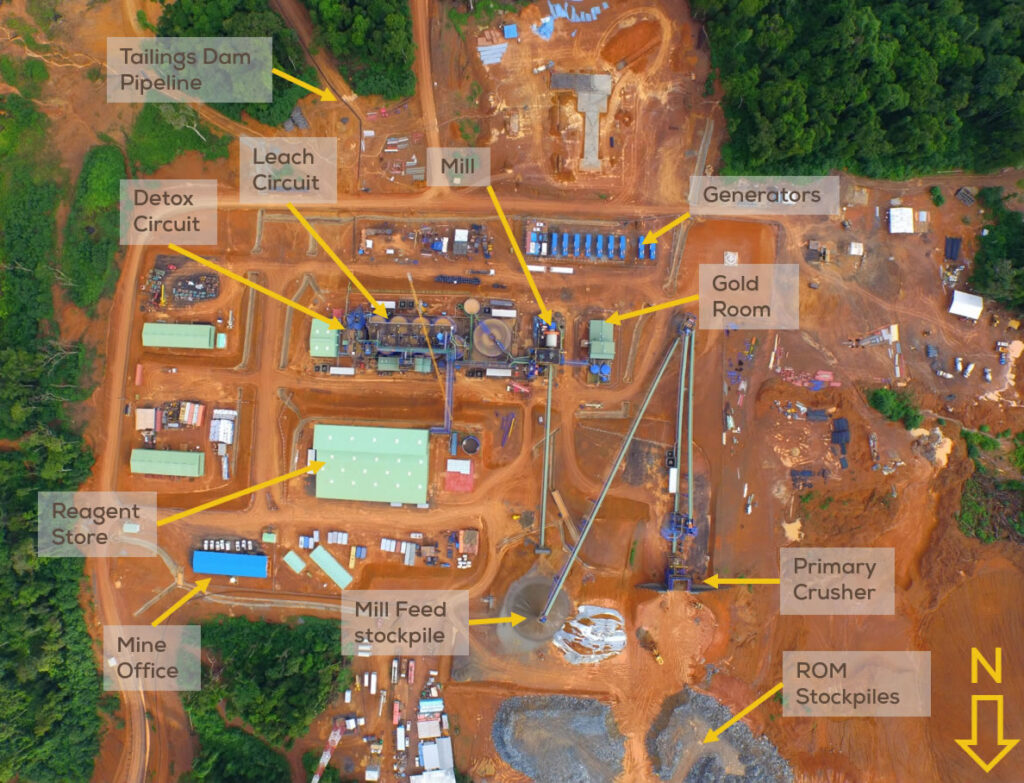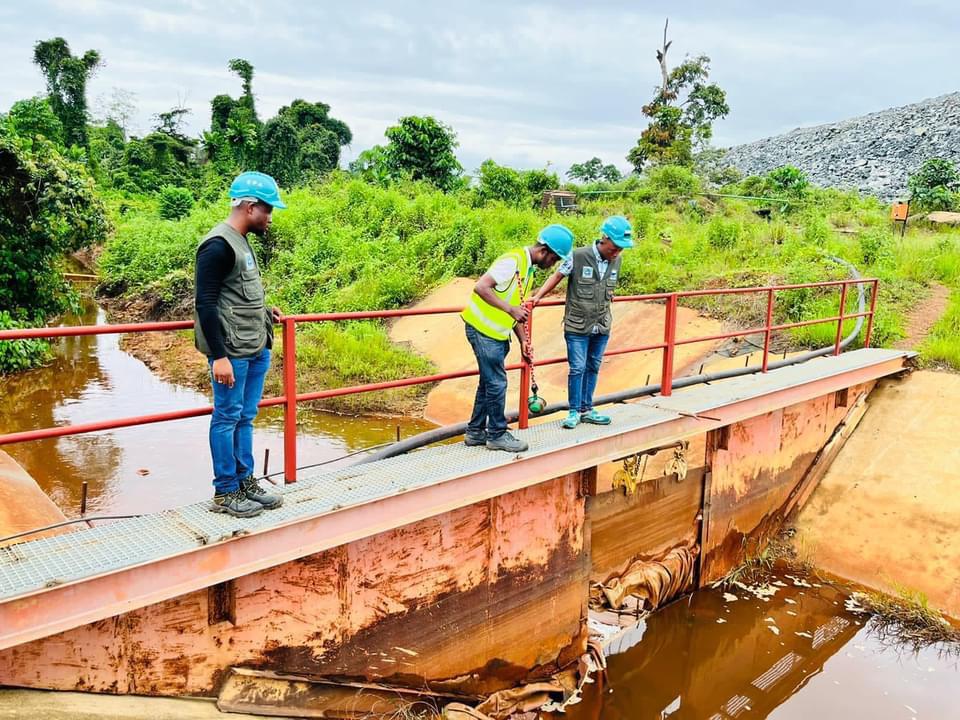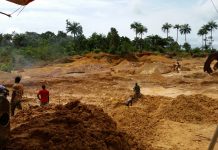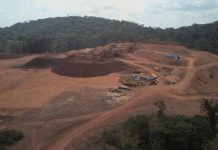Top: Investigators of the Environmental Protection Agency (EPA) at Bea Mountain Mining Corporation’s waste plant in Kinjor, Grand Cape Mount County. Picture credit: Facebook/EPA Liberia
By Mark B. Newa
MONROVIA – Chemicals from a waste facility operated by Bea Mountain Mining Corporation (BMMC) leaked into a river in Grand Cape Mount County in February, a report concealed by the Environmental Protection Agency (EPA), obtained by The DayLight, found.
It marks the second year in a row for the pollution to happen and the fifth time within the last decade, according to official records and The DayLight’s review of news articles.
The report, conducted the same month of the spillage but has not been published, found cyanide and copper from the plant at the New Liberty Goldmine seeped into water sources in Jikando, Gola Konneh District. It said EPA investigators saw Bea Mountain release copper sulphate from the facility into the environment. Cyanide and copper sulphate are used to mine gold and are dangerous to people’s health, and can lead to death.
“The death of aquatic species may have resulted from elevated free cyanide and dissolved copper levels due to exposure to higher than permissible limits of free cyanide,” the report said. It called on Bea Mountain to “regularly repair and upgrade” the plant according to its waste management permit. It also mandated the firm to supply villagers with food and water for 45 days after February 20, and that the period could be extended.
“No sign of life was observed in the Marvoe Creek,” according to the report. Marvoe Creek is one of the largest tributaries that connect to Mafa River, which meanders along several villages and empties into Lake Piso in Robertsport, the western county’s capital.
By polluting the environment in the area, Bea Mountain violated the Environmental Protection and Management Law of Liberia. Violators of the law face up to a US$50,000 fine upon conviction in court.
The report added that Bea Mountain collected its own sample, instead of an independent firm as the law requires. It said the lawyer of the community also extracted a sample of dead fish from the scene of the pollution.
The report said Bea Mountain did not implement all of the recommendations from the report on last year’s spillage but failed to mention specific recommendations. It called on Bea Mountain to resettle villagers living next to the waste facility amid persistent pollution.

“The community vowed to protest if the issue of the pollution is not adequately addressed by the government,” it said. People are migrating to other places since last year’s incident, leaving the Jikando with 250 people, according to the report. Other residents also want out, it added.
It was unclear whether the EPA notified the company of the penalties associated with the spillage, one of the things the report recommended. EPA did not immediately respond to The DayLight’s queries on why it kept the report on this year’s spillage secret. Unlike last year’s incident, there was no statement or press conference this term. The public is yet to get any information on the penalties the agencies imposed on the company at any time.
Concealing information violates the public-participation principle of the environmental law of Liberia. The principle mandates the EPA to “ensure maximum participation by the Liberian people in the management and decision-making processes of the environment and natural resources.”
Previous Spills
This year’s spillage happened 10 months after the one last year. That May, an EPA report found spillage of chemicals from the same waste facility. Pictures of a dead dog and fish due to the spillage flooded social media pages.
The EPA said in a statement at the time the company “Severely disrupted and injured the livelihood of the communities that depend on these water sources.”
Bea Mountain denied any wrongdoing, saying the report was “inconclusive and filled with analytical gaps. We are confident and particularly reaffirm our position of being in no breach of any required scientific standards,” it said in a statement at the time. The EPA then issued another statement, restating its position that a chemical compound had leaked from the company’s waste plant.
But in a dramatic turnaround, the EPA cleared the company of wrongdoing on August 8, just over two months after it found the leak. The agency said it was “pleased to inform you that all facilities tested were appreciably below the permissible level set up by the EPA.”
That was not the first spillage. There were three previous spills in 2015, 2016 and 2018. Villages said they caught rashes after using water from nearby creeks following the accident. Bea Mountain denied people sick.
In 2021, over 10,000 villagers filed a complaint with German and French banks DEG and Proparco, respectively, over 2015 the 2016 pollutions. The banks invested in the goldmine.
Efforts to contact Bea Mountain for this story did not immediately materialize. We will update the story once we get comments from the company or the EPA.
Bea Mountain Mining Corporation signed a 25-year agreement with the Liberian government on July 29, 2009. The Turkish-owned industrial goldmine is Liberia’s first goldmine. The International Finance Corporation (IFC), the private sector arm of the World Bank, invested some £5.3 million in the project.
[CORRECTION: This version of the story corrects a previous, which left out a 2018 spill to make it five in a decade]
Funding for this story was provided by the Green Livelihood Alliance (GLA 2.0) through the Sustainable Development Institute (SDI). The DayLight maintained complete editorial independence over the story’s content.





Facebook Comments